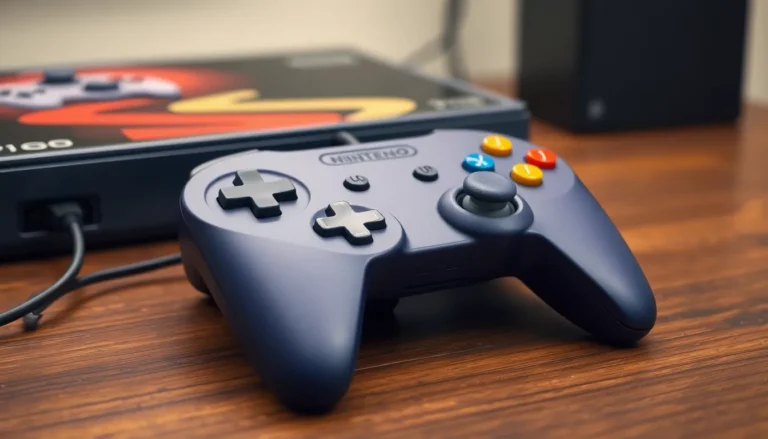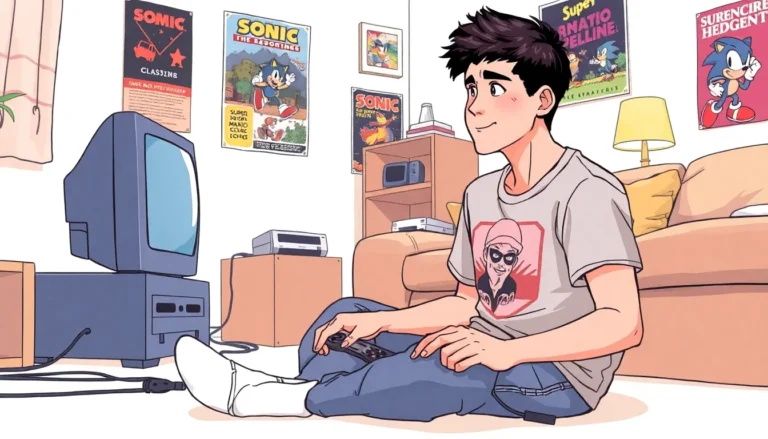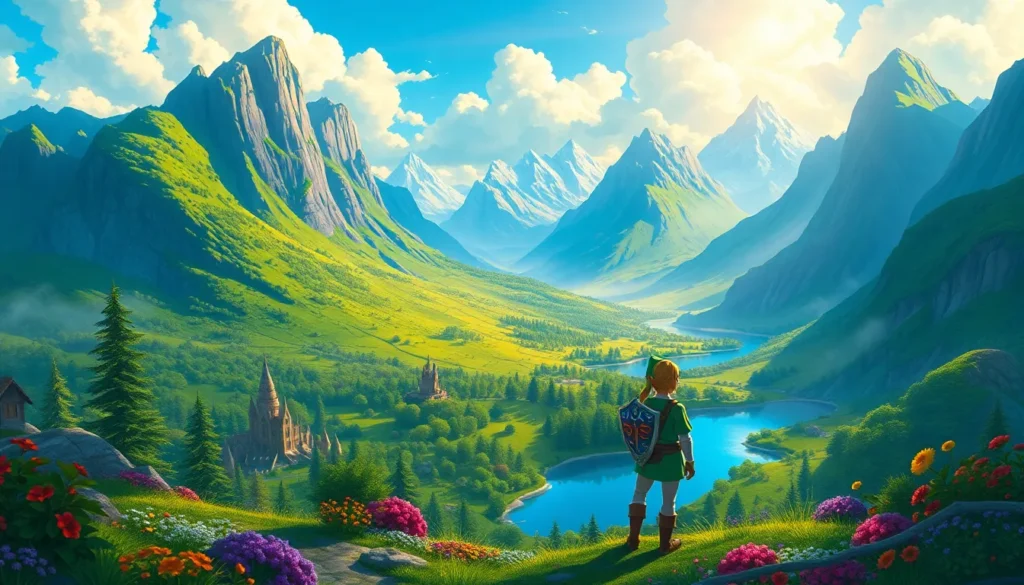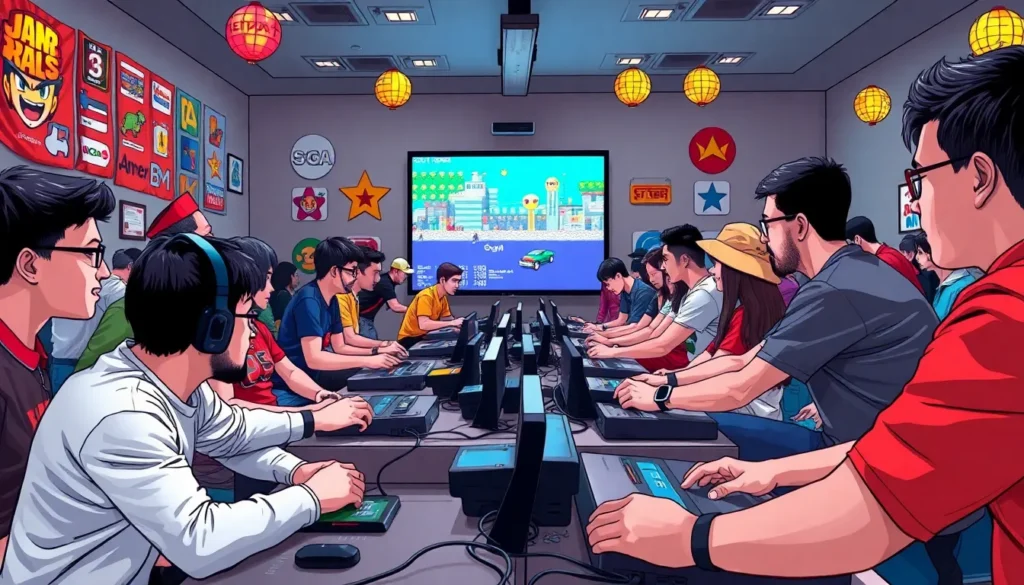Nostalgia’s a powerful thing, and nothing brings back those warm fuzzy feelings quite like the retro gaming scene. Picture this: pixelated graphics, 8-bit soundtracks, and the thrill of blowing into a cartridge just to get it to work. It’s like stepping into a time machine where every level is a trip down memory lane, and every game is a classic waiting to be rediscovered.
Table of Contents
ToggleOverview of Retro Gaming Scene
Retro gaming holds a unique position within the broader gaming landscape. It celebrates the simplicity and creativity of earlier video games, creating a community that cherishes these classic experiences. Players often find themselves drawn to games released during the 1970s through the 1990s, a period marked by groundbreaking innovations.
Nostalgic elements define the retro gaming scene. Iconic systems like the Nintendo Entertainment System (NES) and Sega Genesis brought unforgettable titles, including “Super Mario Bros.” and “Sonic the Hedgehog.” Many enthusiasts still play these games today, using original consoles or modern emulation methods.
Events and conventions play a significant role in the retro gaming community. They provide opportunities for enthusiasts to connect, share experiences, and showcase their collections. Many gamers enjoy trading cartridges and memorabilia, emphasizing the culture surrounding these classic titles.
Gaming forums and social media groups expand the retro gaming community. Online platforms facilitate discussions about game strategies, collectibles, and restoration techniques. Players share tips on preserving vintage hardware, ensuring that these cherished consoles remain functional for future generations.
Merchandising also flourishes within the retro gaming scene. Apparel, art, and collectibles inspired by classic titles appeal to both nostalgic fans and new players. This merchandise contributes to the culture, allowing fans to express their love for iconic franchises beyond gameplay.
Ultimately, the retro gaming scene thrives on a shared passion for history and creativity. It engages gamers who appreciate the artistry of early game design while inviting newcomers to explore classic titles. This community continues to expand, ensuring that the charm of retro gaming remains relevant today.
Popular Retro Gaming Consoles
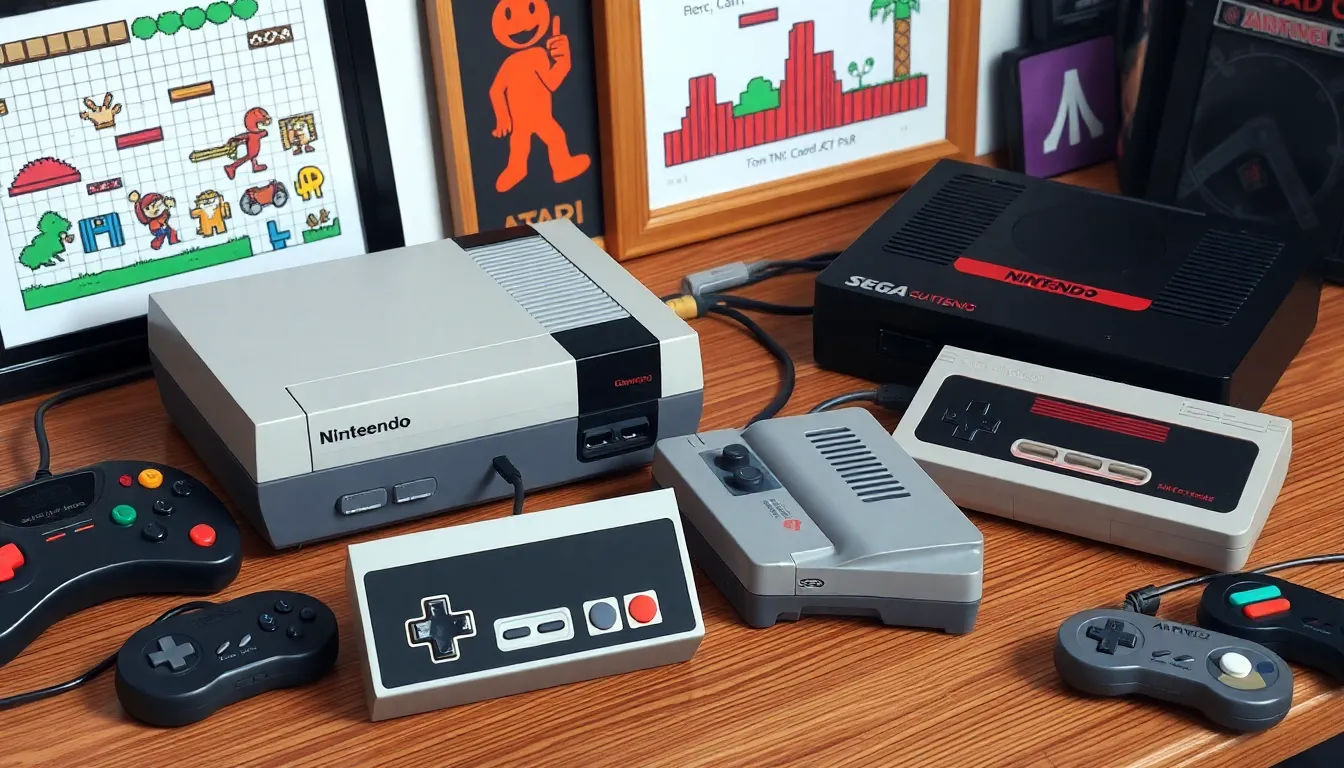
Retro gaming consoles serve as iconic gateways to the past, bringing back cherished memories for many players. These devices laid the foundation for contemporary gaming.
Classic Consoles that Shaped Gaming
The Nintendo Entertainment System (NES) revolutionized the gaming world with titles like “Super Mario Bros.” and “The Legend of Zelda.” This system introduced players to rich narratives and engaging gameplay. Sega Genesis offered the thrilling experience of “Sonic the Hedgehog,” showcasing fast-paced action that defined a generation. Atari 2600 played a crucial role by popularizing home gaming, featuring titles like “Pong” and “Space Invaders.” Each of these consoles made significant contributions, influencing game design, creativity, and technological advancements.
Modern Takes on Retro Consoles
Modern consoles often pay homage to their classic predecessors while incorporating advanced technology. The Nintendo Classic Mini: NES provides players with an experience reminiscent of the original NES, featuring 30 pre-installed games. Sega Genesis Mini delivers an authentic experience with HD graphics and classic titles. Consoles like the PlayStation Classic appeal to nostalgia by offering games from the original PlayStation era. Thanks to these innovations, the retro gaming phenomenon continues attracting new audiences while celebrating the foundations of gaming history.
Retro Gaming Genres
Retro gaming encompasses diverse genres, each contributing uniquely to the gaming landscape. Classic titles evoke nostalgia while introducing players to varied gameplay experiences.
Platformers and Their Impact
Platformers emerged as a defining genre in retro gaming, captivating audiences with their engaging mechanics and colorful graphics. Games like “Super Mario Bros.” revolutionized the genre, featuring Mario’s exhilarating jumps and power-ups. Iconic levels reinforced gameplay dynamics, while simple controls made these titles accessible to players of all ages. The genre’s emphasis on creativity paved the way for innovative game design, inspiring countless successors and setting the foundation for modern platformers.
RPGs in the Retro Era
Role-playing games (RPGs) captured the imaginations of players in the retro era. Titles like “Final Fantasy” and “The Legend of Zelda” offered immersive worlds rich with storytelling and character development. Players explored intricate plots, made impactful choices, and engaged in strategic battles. RPGs built unique ecosystems within the gaming community, encouraging social interaction and collaboration. Their complexity laid the groundwork for contemporary RPGs, showcasing how retro experiences shaped the evolution of gaming narratives.
Community and Culture
The retro gaming scene thrives on strong community support and cultural events that celebrate classic games. This collaboration fosters connections among enthusiasts who cherish the history and nostalgia of gaming.
Online Platforms and Forums
Online platforms and forums serve as crucial resources for retro gaming enthusiasts. These spaces facilitate discussions about game mechanics, strategies, and restoration techniques. Communities like Reddit and specialized forums allow users to share tips for revitalizing vintage hardware and finding rare games. Players often showcase their collections, building relationships and sharing experiences. Social media groups connect individuals across the globe, creating a diverse network centered around classic gaming.
Retro Gaming Events and Conventions
Retro gaming events and conventions create vibrant environments for fans to engage and celebrate their passion. Events such as the Portland Retro Gaming Expo and the Midwest Gaming Classic offer attendees the opportunity to connect, trade, and compete in classic games. Conventions often feature panels with industry veterans, providing insights into the evolution of gaming. Collectibles, merchandise, and artwork from retro games attract fans and provide chances for exclusive purchases. These gatherings not only reinforce community bonds but also highlight the enduring legacy of classic gaming culture.
Preservation and Emulation
Preservation and emulation play crucial roles in maintaining the retro gaming scene. They ensure access to classic games, allowing players to rediscover timeless titles.
The Importance of Game Preservation
Game preservation safeguards gaming history and culture. Many classic titles risk becoming obsolete due to aging hardware and software. From arcade cabinets to cartridge-based games, significant collections deserve attention. By archiving these games, enthusiasts can protect original content and experience early designs. Various organizations and volunteers focus on cataloging and digitizing games. Preserving manuals, art, and other materials enhances the overall historical record. This effort helps maintain a connection between generations of gamers. As a result, newer players gain insights into the evolution of gameplay and design.
Emulation Software and Hardware
Emulation software and hardware allow retro games to be played on modern devices. This technology enables gamers to experience classic titles without original consoles. Devices like Raspberry Pi and PCs run emulators that replicate old systems precisely. Numerous emulation software options exist, catering to various platforms and preferences. Popular programs such as RetroArch and MAME support a wide array of games. Many modern consoles also include built-in emulation features or library collections. These advancements make retro gaming accessible to new audiences. Emulation often faces legal hurdles, but it continues to evolve, enabling appreciation for enduring classics.
The retro gaming scene thrives on a deep-rooted love for the classics that shaped the industry. With a vibrant community of enthusiasts and a growing interest in preserving gaming history, it continues to evolve while honoring its past. Modern consoles and events keep the spirit alive, inviting both nostalgic players and newcomers to experience the magic of early gaming.
As technology advances, the charm of retro games remains timeless. The unique blend of simplicity and creativity in these titles resonates with players of all ages. Whether through online forums or local conventions, the passion for retro gaming fosters connections that celebrate a shared history and the joy of gaming.



